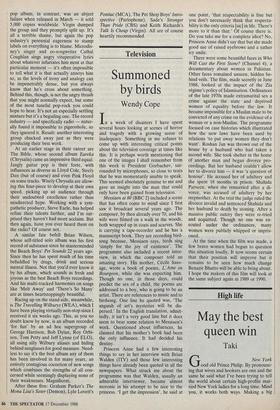Television
Summoned by birds
Wendy Cope
I. n a week of disasters I have spent several hours looking at scenes of horror and tragedy with a growing sense of inadequacy. Something in me refuses to come up with interesting critical points about the television coverage at times like this. It is perhaps worth mentioning that one of the images I shall remember from this week is President Gorbachev, sur- rounded by microphones, so close to tears that he was momentarily unable to speak. This seemed absolutely genuine to me and gave an insight into the man that could only have been gained from television.
Messiaen at 80 (BBC 2) included a scene that has often come to mind since 1 first saw it broadcast several years ago. The composer, by then already over 70, and his wife were filmed on a walk in the woods, both wrapped up in coats and scarves. She is carrying a tape-recorder and he has a manuscript book. They are recording bird- song because, Messiaen says, birds sing 'simply for the joy of existence'. The programme also included a recent inter- view, in which the composer told an amazing story. His mother, Cecile Sauv- age, wrote a book of poems, L'Anze en Bourgeon, while she was expecting him. Though no one, in those days, could predict the sex of a child, the poems are addressed to a boy, who is going to be an artist. There are references to music and to birdsong. One line he quoted was, 'The anguish of art's mysteries will be dis- persed.' In the English translation, admit- tedly, it isn't a very good line but it does seem to bear some relation to Messiaen's work. Questioned about influences, he claimed that his mother's book had been the only influence. It had decided his destiny.
Princess Anne had a few interesting things to say in her interview with Brian Walden (ITV) and those few interesting things have already been quoted in all the newspapers. What struck me about the programme was that Walden, usually an admirable interviewer, became almost moronic in his attempt to be nice to the princess. 'I get the impression', he said at one point, 'that respectability is fine but you don't necessarily think that respecta- bility is the only criteria [sic] in life. There's more to it than that.' Of course there is. Do you take me for a complete idiot? No, Princess Anne didn't say that but she made good use of raised eyebrows and a rather icy smile.
There were some beautiful faces in Who Will Cast the First Stone? (Channel 4), a documentary about women in Pakistan. Other faces remained unseen, hidden be- hind veils. The film, made secretly in June 1988, looked at the impact of the Zia regime's policy of Islamisation. Ordinances of the late 1970s made extramarital sex a crime against the state and deprived women of equality before the law. It became impossible for a Muslim male to be convicted of any crime on the evidence of a woman or a non-Muslim. The programme focused on case histories which illustrated how the new laws have been used by relations `to put away women they don't want'. Roshan Jan was thrown out of the house by a husband who had taken a second wife. She took shelter in the home of another man and began divorce pro- ceedings. But her husband couldn't allow her to divorce him — it was 'a question of honour'. He dccused her of adultery and she spent 18 months in prison. Shahida Parveen, when she remarried after a di- vorce, was accused of adultery by her stepmother. At the trial the judge ruled the divorce invalid and sentenced Shahida and her husband to death by stoning. After a massive public outcry they were re-tried and acquitted. Though no one was ex- ecuted under the ordinances, many women were publicly whipped or impris- oned.
At the time when the film was made, a few brave women had begun to question this situation loudly. It now seems certain that their position will improve but it remains to be seen how much change Benazir Bhutto will be able to bring about. I hope the makers of this film will look at the same subject again in 1989 or 1990.


























































 Previous page
Previous page